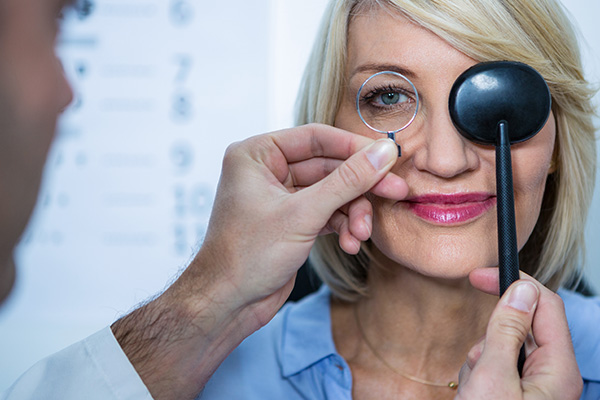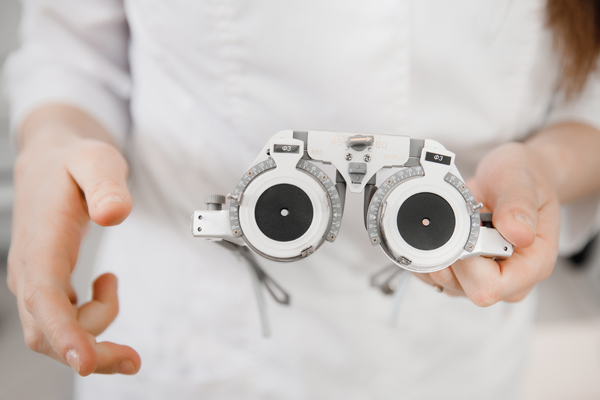Reasons an Optometrist Dilates a Patient’s Pupils During an Examination

Learning more about the importance of visiting an optometrist on a regular basis or when you are experiencing any type of problem with your eyes is a great idea. Optometrists, also known as eye care doctors, are the primary health care professionals for making sure that your eyes are in good health. Ready to learn more about what happens during a regular eye examination?
What happens during optometry eye examinations?
Eye exams require you to undergo a number of optometry tests that are specifically designed to evaluate your vision, as well as check for any eye disorders or diseases. Optometrists will often use a number of special instruments in order to perform an examination, and the results they receive allow them to make a proper diagnosis. While many patients schedule appointments for eye examinations for vision reasons, these exams also help detect any eye problems when they first begin, allowing for more treatment options.
Reasons an optometrist dilates a patient’s pupils during an examination
Every patient can expect their eyes to be dilated during their first eye examination, as this allows an optometrist to understand their overall eye health. Patients who have previously undergone multiple eye examinations in which they had their eyes dilated may not need to have their eyes dilated during future examinations if no eye problems were found during the previous examinations. The list below includes common reasons that optometrists will dilate their patients' pupils before performing an eye examination.
When a patient has a higher risk for future eye problems
Patients who have previously been diagnosed with an eye disorder or an eye disease have a higher risk of experiencing future eye-related problems. This makes it necessary for optometrists to dilate their eyes as a preventive measure. Patients who have been diagnosed with health-related problems, like diabetes, are also at a higher risk for developing future eye problems.
Because they are over the age of 40
Patients over the age of 40 are considered to be at greater risk when it comes to being diagnosed with eye disorders and/or eye diseases. This makes it necessary for an optometrist to dilate their eyes so they can perform a thorough eye examination. When the eyes are dilated, it makes the pupils wider, which allows an optometrist to see inside of the eye much easier.
To look for specific eye-related problems
Eye doctors not only look for eye-related problems, but they can also look for health-related problems that may get in the way of someone being able to experience good eye health. Two common health problems they will look for in patients who have dilated eyes include hypertension and diabetes, as these two health problems can damage the eye's blood vessels and nerves.
Are you in need of an eye examination?
Our optometrist can perform an eye examination on you, which allows you to understand the current state of your eye health. Even if you are not currently experiencing any eye problems, it is still a good idea to make regular appointments with a professional optometrist to be sure that your eyes are completely healthy. The peace of mind that comes with making regular eye care appointments is irreplaceable, as you do not want to do anything to jeopardize your good vision.
Request an appointment here: https://www.carmieyecare.com or call Carmi Eye Care at (618) 374-0513 for an appointment in our Carmi office.
Check out what others are saying about our services on Yelp: Read our Yelp reviews.
Related Posts
Sunglasses have become a part of many people's wardrobes; however, they are also a great tool for protecting the eyes. Along with playing a large role in our daily lives, eyes are also sensitive to many things—sunlight being one of them. It is easy for one's eyes to sustain damage from direct sunlight exposure. Thankfully,…
If someone is suffering from pink eye, which is also known as conjunctivitis, a visit to the eye doctor may be warranted to confirm the diagnosis. Pink eye is an infection or inflammation of the membrane that lines the eyelid. Common symptoms of this very contagious condition include redness of the eye, itchiness, tearing and…
A comprehensive eye exam does more than assess vision; it can also reveal early signs of various health conditions. Many systemic diseases affect the eyes before other symptoms appear, making regular exams essential to overall health care. Optometrists use advanced diagnostic techniques to detect conditions beyond vision problems, allowing for early intervention and treatment.Routine eye…
When it comes to eye care, understanding the difference between an optometrist and an ophthalmologist is essential in order to receive the appropriate treatment. While both professionals specialize in eye health, their roles, qualifications, and scope of practice vary significantly. Knowing when to consult an optometrist versus an ophthalmologist can ensure that individuals receive the…


